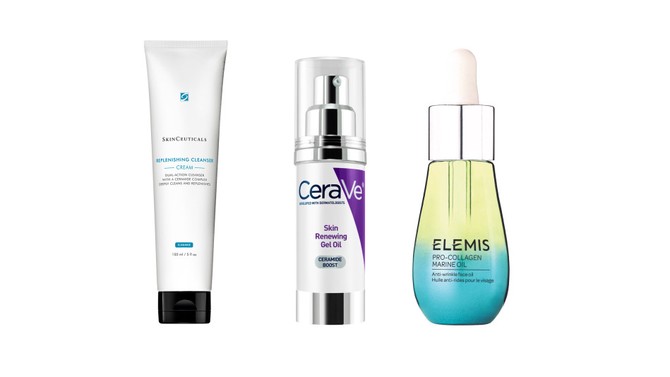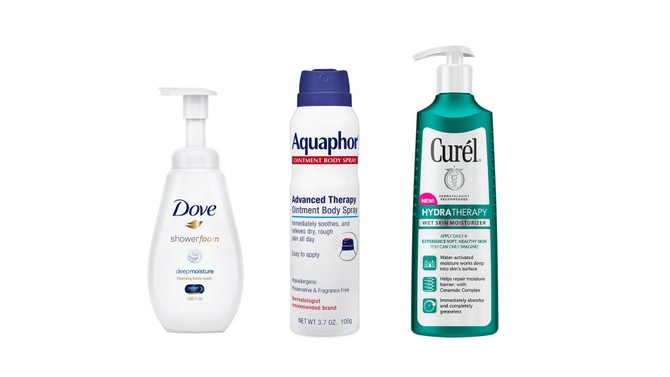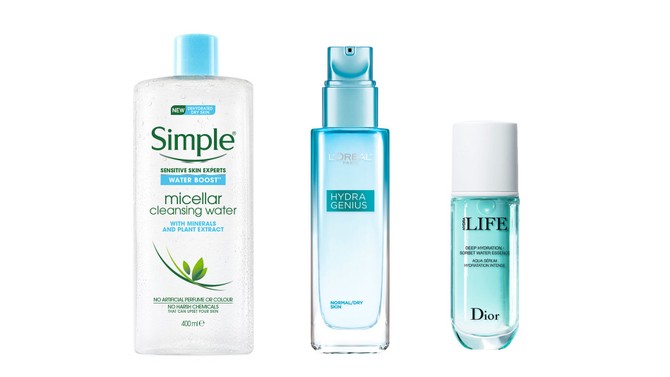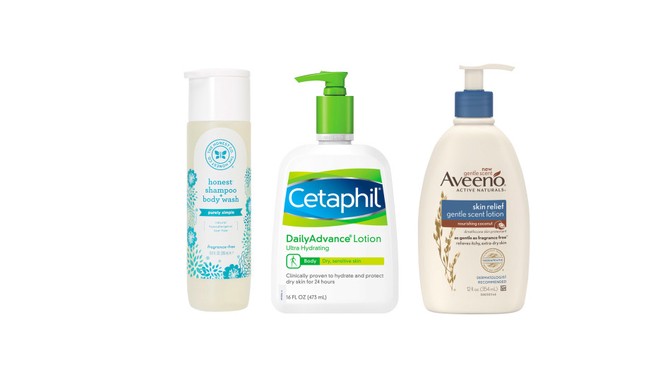Is Your Skin Dry or Dehydrated? Here's How to Tell
By Holly Carter

Photos: Courtesy of Companies
The Naked Truth
As the weather gets colder, you may be getting itchier, flakier, ashier—and crankier. To find the right treatment plan, you need to answer one question: Is your skin truly dry or just dehydrated? Here’s how to find out, along with dermatologists' targeted tips for soothing and smoothing.
Really look at and touch your skin, and pay attention to any changes over time to accurately assess what it needs. If it routinely feels coarse, you’re probably dry. If it’s typically normal but seems to be going through a less-than-silky stage, dehydration is most likely the issue at hand (or elbow, or knee).
Your skin is dry if...it consistently feels rough and itchy, looks blotchy, or is flaky. The top layer of your skin, the epidermis, is itself made up of layers. You can think of the outermost one, called the stratum corneum (derms also refer to it as the “barrier”), as a brick wall. “The bricks are skin cells, and the mortar is made up of natural oils that hold it all together,” says Joshua Zeichner, MD, director of cosmetic and clinical research in dermatology at Mount Sinai Hospital in New York City. Dry skin doesn’t produce enough of this mortar, leaving the stratum corneum permeable and vulnerable to water loss.
Here's The Plan
Your strategy is to protect what precious oil your skin actually does produce and give it an assist with nourishing ingredients that seal in moisture.
Dry Skin: For Your Face
Cleanse gently. You don’t want to strip away that barrier-reinforcing oil. So choose a creamy formula with no harsh foaming detergents like sodium lauryl sulfate or sodium laureth sulfate (1). Bonus points if it contains skin-friendly fats called ceramides (more on those below).
Turn down the heat. A toasty pick-me-up feels great on a chilly morning, but the water you wash your face with should be lukewarm. “Think of the temperature of a heated pool,” says Zeichner. Anything hotter can strip away essential oils, or mortar, from the outer layer of skin.
Seek out ceramides. These waxy fats are naturally produced by skin as part of that mortar. Your complexion needs more of them—and most creams and serums are infused with lab-made versions that work like the real thing, says cosmetic chemist Perry Romanowski. Slather on one of them (2) twice daily (nighttime use is particularly important since that’s when the skin’s hydration level is naturally low, says Zeichner).
Avoid irritation. Potent antiaging agents like retinol and alpha hydroxy acids can aggravate your already-compromised skin. To increase your tolerance of these ingredients, use them every other day, dilute your products with moisturizer before applying, or prime your skin with a cream first. You could also switch to a product with gentler wrinkle and spot fighters, like peptides, growth factors, or marine extracts (3).
Skin Savers
1. SkinCeuticals Replenishing Cleanser ($34; SkinCeuticals.com)
2. CeraVe Skin Renewing Gel Oil ($25; drugstores)
3. Elemis Pro-Collagen Marine Oil ($79; Elemis.com)
Really look at and touch your skin, and pay attention to any changes over time to accurately assess what it needs. If it routinely feels coarse, you’re probably dry. If it’s typically normal but seems to be going through a less-than-silky stage, dehydration is most likely the issue at hand (or elbow, or knee).
Your skin is dry if...it consistently feels rough and itchy, looks blotchy, or is flaky. The top layer of your skin, the epidermis, is itself made up of layers. You can think of the outermost one, called the stratum corneum (derms also refer to it as the “barrier”), as a brick wall. “The bricks are skin cells, and the mortar is made up of natural oils that hold it all together,” says Joshua Zeichner, MD, director of cosmetic and clinical research in dermatology at Mount Sinai Hospital in New York City. Dry skin doesn’t produce enough of this mortar, leaving the stratum corneum permeable and vulnerable to water loss.
Here's The Plan
Your strategy is to protect what precious oil your skin actually does produce and give it an assist with nourishing ingredients that seal in moisture.
Dry Skin: For Your Face
Skin Savers
1. SkinCeuticals Replenishing Cleanser ($34; SkinCeuticals.com)
2. CeraVe Skin Renewing Gel Oil ($25; drugstores)
3. Elemis Pro-Collagen Marine Oil ($79; Elemis.com)

Photos: Courtesy of Companies
Dry Skin: For Your Body
Skin Savers
1. Dove Deep Moisture Shower Foam ($6; drugstores)
2. Aquaphor Ointment Body Spray ($11; drugstores)
3. Curél Hydra Therapy Wet Skin Moisturizer ($11; drugstores)

Photos: Courtesy of Companies
Booster Shot
Your skin is a dynamic organ that can generally compensate for changes in the environment and maintain hydration. But sometimes it needs a little help—that’s where effective moisturizing treatments come into play.
Your skin is dehydrated if...it suddenly (that’s the key word here) appears dull, becomes red and sensitive, or feels tighter than usual. Even the oiliest skin can experience a bout of dehydration as a result of dry weather, airplane travel, sun exposure, irritating ingredients, or a few too many cocktails. The good news: This, too, shall pass. The even better news: It’s easy to treat.
Here's The Plan
While your skin is having a thirsty spell, handle it with kid gloves—that is, übergentle products and a few simple lifestyle tweaks.
Dehydrated Skin: For Your Face
Wash wisely. You need a product that’s pampering and hydrating, like one of our favorites, micellar water. This no-rinse formula—think of it as a supercharged liquid makeup remover—contains micelles, tiny molecules that gently trap and remove dirt and oil without stripping skin (1), says Romanowski.
Increase water absorption. Right now your best ally is a humectant. This ingredient pulls water from the air and the deeper layers of your skin to intensely hydrate. Two of the most common are hyaluronic acid and glycerin (2 and 3). If you don’t want a rich cream, the new hydration serums are made for you: They have a lighter texture that’s perfect for normal to oily skin.
Watch your diet. Yes, you can moisturize skin from within—just pile your plate with foods rich in omega-3 fatty acids. Research shows these nutrients, found in flaxseed and many nuts and fish, can reduce inflammation and help strengthen skin cell membranes, improving their ability to hold on to precious moisture. As you fill up on omega-3s, increase your water intake and cut back on diuretics like caffeine and alcohol: For every glass of alcohol you down, your body can be depleted of the same amount of water and then some.
Hike the humidity. “An arid environment will grab moisture from any source it can find, including your skin,” says Idriss. The fix: a humidifier. Put one in your bedroom to create your own hydrating microclimate.
Skin Savers
1. Simple Water Boost Micellar Cleansing Water ($9; drugstores)
2. L’Oréal Paris Hydra Genius Daily Liquid Care for Normal/Oily Skin ($18; drugstores)
3. Dior Hydra Life Deep Hydration Sorbet Water Essence ($73; Dior.com)
Your skin is dehydrated if...it suddenly (that’s the key word here) appears dull, becomes red and sensitive, or feels tighter than usual. Even the oiliest skin can experience a bout of dehydration as a result of dry weather, airplane travel, sun exposure, irritating ingredients, or a few too many cocktails. The good news: This, too, shall pass. The even better news: It’s easy to treat.
Here's The Plan
While your skin is having a thirsty spell, handle it with kid gloves—that is, übergentle products and a few simple lifestyle tweaks.
Dehydrated Skin: For Your Face
Skin Savers
1. Simple Water Boost Micellar Cleansing Water ($9; drugstores)
2. L’Oréal Paris Hydra Genius Daily Liquid Care for Normal/Oily Skin ($18; drugstores)
3. Dior Hydra Life Deep Hydration Sorbet Water Essence ($73; Dior.com)

Photos: Courtesy of Companies
Dehydrated Skin: For Your Body
Skin Savers
1. The Honest Co. Honest Shampoo + Body Wash Fragrance-Free ($10; Honest.com)
2. Cetaphil DailyAdvance Lotion Ultra Hydrating ($13; drugstores)
3. Aveeno Skin Relief Gentle Scent Lotion Nourishing Coconut ($10; drugstores)
From the November 2017 issue of O, The Oprah Magazine

